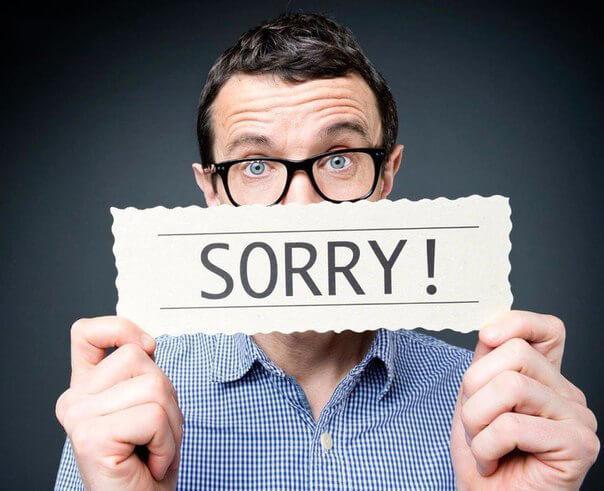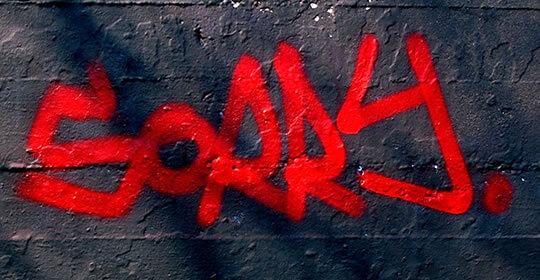435
Perfect apology: how to apologize
Of the six components of a good apology two are the most effective.
According to a new study there are six components of an effective apology:

However, the two components are more important than others.
The first is the acceptance of responsibility, "explains one of the study's authors, Professor Roy lewicki.
"Our study showed that the most important component of apology is an admission of liability. Say it is your fault that you made a mistake."
The second most effective after acknowledgement of responsibility strategy is a proposal to remedy the situation.
Professor lewicki says:
One of the main problems of the apology is that in itself, the apology is worthless. Expression of willingness to fix things, reflect the acceptance of responsibility for damages.
The next important thing is the expression of regret, explanation of what went wrong, and expression of remorse.
The last step is a request for forgiveness, "says lewicki:
If necessary, you can skip this step.
These findings are based on a study in which people read different scenarios in which people have made the mistake, and had to apologize.
The apology contained one, three or six components. People evaluated the effectiveness of different types of apologies. The study tested only the efficiency of the specified components.
Lewicki also pointed out another very important factor:
"It is also clear that when you apologize, it is very important eye contact and appropriate tone of sincere"
Also it is very easy to overestimate the power of apology, as I wrote before.
How effective is an apology?
We assume that apologies can help to build relationships, but we overestimate the importance of the apology?
Not a week goes by without another apology of a social worker for the incredible destruction. The endless parade of politicians, businessmen and celebrities on TV and in the press, recognizing the error and izvinyaysya for what they did wrong.
We came to the conclusion that as soon as the day follows night, a public figure apologizes for any offense. Sometimes these apologies seem sincere and heartfelt, and sometimes they are just formal and insincere.
Penitent hope their admission of guilt with reddened faces will bring forgiveness, but is it really enough to say excuse me to restore confidence?

High expectations
In personal life, we also often have high expectations of the significance of the word "sorry". Most of us brought up in a culture of apology: children must say sorry when they did something wrong, and adults should apologize if you encountered someone on the street.
How inflated these expectations were demonstrated by the German psychologist David Kramer and his colleagues in a new study published in the journal Psychological Science. They had a suspicion that the apology is not as important as we think.
In their study, participants played a game of trust. Each participant was given 10 euros and assigned a partner who actually knew about the purpose of the experiment. Participants said that if they give all the money to the partner, they will be multiplied three times, and then their partner would decide how many of those 30 Euro to give back.
I actually gave only 5 euros and participant in the experiment felt cheated. This installation included the opportunity for experimenters to evaluate the apology. However, only half of the participants received a real apology, while the other half only conditional.
Then the participants were evaluated on a scale from 1 to 7, how conditional and full apology was "relevant" and "important".Participants who have received a conditional apology, appreciated his average to 5.3. points. However, those who have received a sincere apology, appreciated by only 3.5 points.
This confirmed the suspicions of the experimenters that people constantly overestimate the significance of the apology. When their partner is a crook brought a sincere apology, they were not as much good as a conventional.
An apology is only the beginning
This conclusion reflects our experience apologies of public figures. We believe that the bug needs to be fixed and have high expectations for the apology, but they often disappoint us.
Definitely it would be wrong to say that apologies are useless. The apology is the recognition of the existence of social norms and their violation. A sincere apology can help to restore the dignity of the victim and the reputation of the guilty.
People it would be better to apologize and take responsibility for their actions than to try to justify or deny the mistake. Psychological research confirms the perception that the excuses and denial just annoy people.
While apologies are useful as a first step, we can easily overestimate the work they can do to restore relations. That's often why it is annoying when public figures apologize, and then act as if nothing had happened.
Worse when we see someone forced to the apology, which, in essence, insincere. We often notice this type of Scam and ignored the apology.
Insincere apology
It is highly ironic that people are not able to distinguish insincere apology when it is addressed to them.
According to a series of studies conducted by Risen and Gilovich (2007), observers are much more ruthless to the insincere apology than the people to whom they are addressed. Perhaps this partly explains why people almost always accept an apology addressed to them, whether they are sincere or not. We want to believe in the sincerity, no matter how much later, we may feel that it's not working.
This is similar to when someone flatters us. Watching I can say that it's flattering, but we tend to think that this is sincere, because it makes us feel better.
On the contrary, Riesen] (Risen and Gilovich found that observers tend to notice insincere apology is much easier and more likely to reject it. This reflects the situation when we see an apology by public officials. The slightest whiff of insincerity, and we all quickly rejected.
Is You I wonder:
Don'T turn the soul inside out!
There are people-chances...
Moreover, that insincere apology does not compensate for anything, but they can also cause harm, causing us to feel angry and distrustful towards those who are trying to cheat, begging for forgiveness
Even a sincere apology is only the beginning of the recovery process. Although we expect the words "I'm sorry" will do a thing, they are hardly so valuable as we expected.
P. S. And remember, only by changing their consumption — together we change the world! ©
Source: ru.sott.net/article/2600-idealnoe-izvinenie-priznanie-otvetstvennosti-i-sovershennoy-oshibki
According to a new study there are six components of an effective apology:
- The expression of regret
- Explanation of what was done wrong
- Acceptance of responsibility
- Voluntary recognition
- Offer yourself to fix the situation
- Apology

However, the two components are more important than others.
The first is the acceptance of responsibility, "explains one of the study's authors, Professor Roy lewicki.
"Our study showed that the most important component of apology is an admission of liability. Say it is your fault that you made a mistake."
The second most effective after acknowledgement of responsibility strategy is a proposal to remedy the situation.
Professor lewicki says:
One of the main problems of the apology is that in itself, the apology is worthless. Expression of willingness to fix things, reflect the acceptance of responsibility for damages.
The next important thing is the expression of regret, explanation of what went wrong, and expression of remorse.
The last step is a request for forgiveness, "says lewicki:
If necessary, you can skip this step.
These findings are based on a study in which people read different scenarios in which people have made the mistake, and had to apologize.
The apology contained one, three or six components. People evaluated the effectiveness of different types of apologies. The study tested only the efficiency of the specified components.
Lewicki also pointed out another very important factor:
"It is also clear that when you apologize, it is very important eye contact and appropriate tone of sincere"
Also it is very easy to overestimate the power of apology, as I wrote before.
How effective is an apology?
We assume that apologies can help to build relationships, but we overestimate the importance of the apology?
Not a week goes by without another apology of a social worker for the incredible destruction. The endless parade of politicians, businessmen and celebrities on TV and in the press, recognizing the error and izvinyaysya for what they did wrong.
We came to the conclusion that as soon as the day follows night, a public figure apologizes for any offense. Sometimes these apologies seem sincere and heartfelt, and sometimes they are just formal and insincere.
Penitent hope their admission of guilt with reddened faces will bring forgiveness, but is it really enough to say excuse me to restore confidence?

High expectations
In personal life, we also often have high expectations of the significance of the word "sorry". Most of us brought up in a culture of apology: children must say sorry when they did something wrong, and adults should apologize if you encountered someone on the street.
How inflated these expectations were demonstrated by the German psychologist David Kramer and his colleagues in a new study published in the journal Psychological Science. They had a suspicion that the apology is not as important as we think.
In their study, participants played a game of trust. Each participant was given 10 euros and assigned a partner who actually knew about the purpose of the experiment. Participants said that if they give all the money to the partner, they will be multiplied three times, and then their partner would decide how many of those 30 Euro to give back.
I actually gave only 5 euros and participant in the experiment felt cheated. This installation included the opportunity for experimenters to evaluate the apology. However, only half of the participants received a real apology, while the other half only conditional.
Then the participants were evaluated on a scale from 1 to 7, how conditional and full apology was "relevant" and "important".Participants who have received a conditional apology, appreciated his average to 5.3. points. However, those who have received a sincere apology, appreciated by only 3.5 points.
This confirmed the suspicions of the experimenters that people constantly overestimate the significance of the apology. When their partner is a crook brought a sincere apology, they were not as much good as a conventional.
An apology is only the beginning
This conclusion reflects our experience apologies of public figures. We believe that the bug needs to be fixed and have high expectations for the apology, but they often disappoint us.
Definitely it would be wrong to say that apologies are useless. The apology is the recognition of the existence of social norms and their violation. A sincere apology can help to restore the dignity of the victim and the reputation of the guilty.
People it would be better to apologize and take responsibility for their actions than to try to justify or deny the mistake. Psychological research confirms the perception that the excuses and denial just annoy people.
While apologies are useful as a first step, we can easily overestimate the work they can do to restore relations. That's often why it is annoying when public figures apologize, and then act as if nothing had happened.
Worse when we see someone forced to the apology, which, in essence, insincere. We often notice this type of Scam and ignored the apology.
Insincere apology
It is highly ironic that people are not able to distinguish insincere apology when it is addressed to them.
According to a series of studies conducted by Risen and Gilovich (2007), observers are much more ruthless to the insincere apology than the people to whom they are addressed. Perhaps this partly explains why people almost always accept an apology addressed to them, whether they are sincere or not. We want to believe in the sincerity, no matter how much later, we may feel that it's not working.
This is similar to when someone flatters us. Watching I can say that it's flattering, but we tend to think that this is sincere, because it makes us feel better.
On the contrary, Riesen] (Risen and Gilovich found that observers tend to notice insincere apology is much easier and more likely to reject it. This reflects the situation when we see an apology by public officials. The slightest whiff of insincerity, and we all quickly rejected.
Is You I wonder:
Don'T turn the soul inside out!
There are people-chances...
Moreover, that insincere apology does not compensate for anything, but they can also cause harm, causing us to feel angry and distrustful towards those who are trying to cheat, begging for forgiveness
Even a sincere apology is only the beginning of the recovery process. Although we expect the words "I'm sorry" will do a thing, they are hardly so valuable as we expected.
P. S. And remember, only by changing their consumption — together we change the world! ©
Source: ru.sott.net/article/2600-idealnoe-izvinenie-priznanie-otvetstvennosti-i-sovershennoy-oshibki























